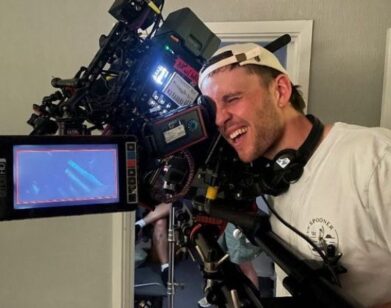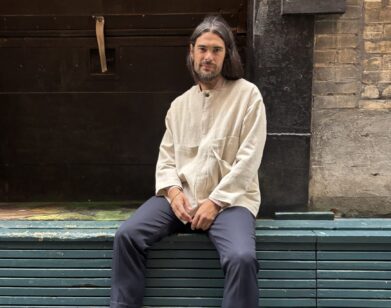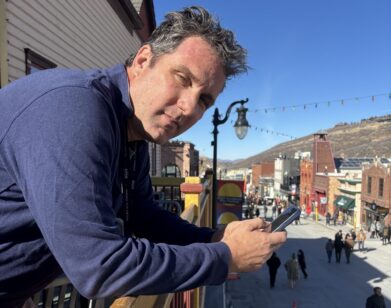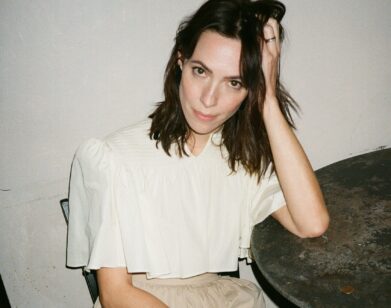ICON
“I’d Kind of Hate to Be 22 Right Now”: Winona Ryder, by Tavi Gevinson
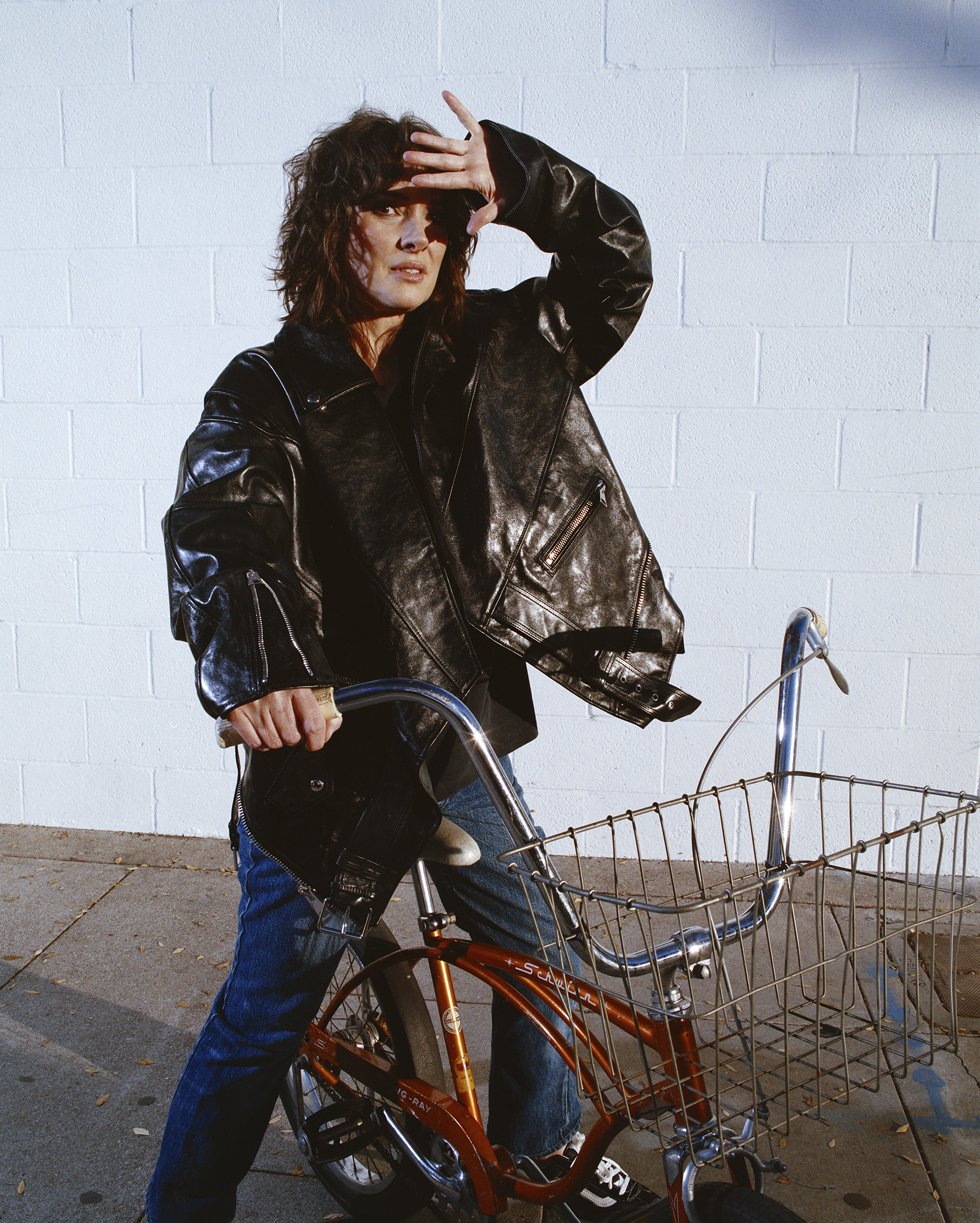
Winona Ryder wears Jacket Givenchy By Sarah Burton. Jeans Winona’s Own. Shoes Vans.
I met Winona Ryder in 2011. I was 15 and had just started Rookie, the online magazine for teens. We’d published a tribute on her birthday, and since it’s October 29th, it was also an occasion to celebrate her witchiest roles, like in Beetlejuice and Heathers. I hoped Rookie might do for our readers what these characters had done for me: validate their rich inner worlds. Winona didn’t just “represent” moody teens—she embodied their complexity, beyond the iconic costumes and quotable lines. Her characters were sensitive, perceptive, and always watching. Winona saw the article and reached out to express her thanks. I got to know her over the next few years and experienced her extraordinary warmth and curiosity. I was struck by her deep love of films, books, and the people who make them. And by her love of sharing this stuff—her touchstones, her memories. She gave me memoirs by Joe Papp and Lee Grant. She gave me a pair of gloves Audrey Hepburn had given her. She knew trivia for every movie that came up in conversation, some filed away from her own encounters with her filmmaking heroes. Always watching. When I started acting professionally, I could talk to Winona about daunting jobs and experience her generosity anew. No longer a moody teen, I found solace in her films about adulthood, falling in love, and losing your mind. And I could better appreciate—I am still in awe of this—how hard it is to perform with the sensitivity that she has now shared with audiences for decades, keeping us watching and showing us how.
———
TUESDAY 12:30 PM OCT. 28, 2025 LA
WINONA RYDER: Tavi.
TAVI GEVINSON: Hi.
RYDER: Oh my gosh, it’s so good to see you. It’s been so long.
GEVINSON: I know. Where are you right now?
RYDER: I’m in L.A. contemplating where to go these days.
GEVINSON: For sure. And isn’t tomorrow your birthday?
RYDER: It is!
GEVINSON: What are you going to do?
RYDER: I think I’m just going to watch my favorite movies.
GEVINSON: Which movies?
RYDER: I’m obsessed with John Sayles movies, and I always have been. Matewan and Lone Star and Passion Fish. I discovered them in my early teenage years. I specifically remember Matewan because it was such a gorgeously shot movie and also completely devastating. It was about stuff I was just getting so interested in, which was labor rights. I think it was the first movie I went to by myself.
GEVINSON: I’ve never seen it, I have to confess.
RYDER: Oh, you would love it.
GEVINSON: Is it your most re-watched movie?
RYDER: I think it might be in terms of the modern stuff. I just showed Scott [Mackinlay Hahn, Ryder’s boyfriend] The Third Man. He’d never seen it, and he went absolutely crazy. It’s sort of like Matewan in that it’s about so many different things that are all haunting and fascinating and terrifying and human. God, I miss that in movies these days.
GEVINSON: Very classic themes of good and evil and human nature and power corrupting.
RYDER: Yes. Humanity is so full of crazy contradictions. I think we’re programmed as girls to think there’s something wrong with us because we’re bouncing all over the place. But then there’s this moment where you realize, “Oh, we’re just human and have contradicting thoughts.”
GEVINSON: Yeah. We’ve been watching the new documentary series on Scorsese and it’s so great. It keeps coming back to that theme of contradictions.
RYDER: Even just in the trailer.
GEVINSON: Saints and sinners is the theme. When I grew up, movies about men being really messy were so appealing for the reasons you’re talking about. There were some examples of female characters who were full of contradictions too—many of which you embodied in roles we grew up watching. I’m so used to that being a gangster movie thing that I didn’t even really realize until watching the documentary that it was actually so subversive for him to be doing that with men in the ’70s, because we just take for granted that they get to be messy.
RYDER: It’s so interesting, isn’t it? I remember sitting in on some of the acting classes at The Actors Studio (where I didn’t go), and in the scene studies classes it was always either the roulette scene from The Deer Hunter or it was Taxi Driver or Jake LaMotta. But then you look at those movies and the female characters are so tremendously complex and the performances are stunning—Cathy Moriarty and Jodie Foster—Alice Doesn’t Live Here Anymore was a groundbreaking movie.
GEVINSON: Definitely.
RYDER: I was recently reading one of my journals from way back. It was when I was doing The Age of Innocence, and I wrote about talking to Marty [Scorsese] and him telling me that he’s always a character in each one of his movies. God, I was such a kid. I was like, “Who are you in this?” And he was Newland, which makes sense. Actually, I didn’t know what was going on in his personal life. What a person. What a perspective. I haven’t finished the documentary series.
GEVINSON: It’s so special. I think someone in it says that more women have been Oscar-nominated for his films than men.
RYDER: Yeah, I was! [Laughs]

Jacket Prada.
GEVINSON: You’re absolutely right, of course. [Laughs]
RYDER: I think Ellen [Burstyn] was, and Jodie—didn’t she win it?
GEVINSON: I can’t remember, but that performance and that casting choice, both so genius.
RYDER: He would screen a lot of films for us before we started shooting, and while we were setting up he’d start talking about a performance in a film. One was Dodsworth. And then suddenly it was “Action!” He was the first director to make me feel like I was the lead, even though I obviously knew that wasn’t the case. But he does make each actor feel that way, which is really remarkable. That’s one thing I was always so curious about with directors: How do they keep a bird’s eye view of all these perspectives? I struggle with keeping one consistent.
GEVINSON: But you have to inhabit it. You’ve worked with so many auteurs, and I was thinking about how in something really stylized, everyone except you gets an outside view—their work is design or aesthetic, and they can see how it’s working. But you have to be inside of it and translate the filmmaker’s style to interiority. How do you see yourself in a world like that? How have you mastered acting in all these different styles? Big question.
RYDER: Such a great question! I imagine that it’s the director’s—and I use this in the best way—manipulation to create where you are and where you’re supposed to be. Tim Burton doesn’t watch in video village. He’s right there, and everything really, really matters to him. People talk about his aesthetic, but he has so much heart. And the conversations we have are really deep and profound—about love and loss and all that. And then I think of someone like Marty. His name is an adjective. Actually, I texted Rebecca Miller because I was so excited. I was like, “Wow, I’ve worked with every member of her family,” because her mother was there all the time on The Crucible.
GEVINSON: That’s amazing. It seems like for Scorsese to mention Dodsworth and for that to translate, you have to have some kind of shorthand, but it also relies on you having an encyclopedic knowledge of film, which you do. Wait, I need to know why you went back to your diaries. I also need to know more about sitting in on The Actors Studio classes. Will you write a book? Because you also have an incredible memory and you have so many amazing stories about working with Arthur Miller and people like that. Those have stayed in my mind for so long.
RYDER: That’s come up, me writing a book, but I feel like I always want to be super respectful of people’s privacy. I still keep a journal. I have this giant dresser and every drawer is full of them. I find old stuff and I’m like, “God, I was so depressed. I must have only written when I was really sad.” But then it was really joyful to find these books full of great memories. There’s also some embarrassing things. I have all my questions about my character for Marty. It was supposed to be me and Daniel [Day-Lewis] and Marty talking about the characters, and I kept bringing things up and Daniel kept being like, “Excuse me,” because it wasn’t helpful for him to hear my perspective. But I didn’t put that together until afterwards. I was like, “Sorry!” It made so much sense after he kind of explained it, and I was really embarrassed.
GEVINSON: That’s so amazing. I have shivers thinking about times when I brought my English teacher’s daughter-slash-heavily therapized vocabulary to a rehearsal room and just taking all the air out of it. [Laughs]
RYDER: What made it even more embarrassing was that I didn’t need to ask these questions. It was things that were very obvious, and I was just saying them. It just felt like I had written these things because it seemed like that’s what I was supposed to do. I had been working with a coach from The Actors Studio who was obviously trying to get on the movie. [Laughs]
GEVINSON: I mean, sometimes I think some reassurance can go a long way.
RYDER: Yeah.
GEVINSON: But that reminds me—The Age of Innocence and Miller and The Plot Against America—you’ve done so many works that have such rich and iconic source material, whether based in literature or history, and I want to know what your relationship is to the original text or research when you’re working on something like that.
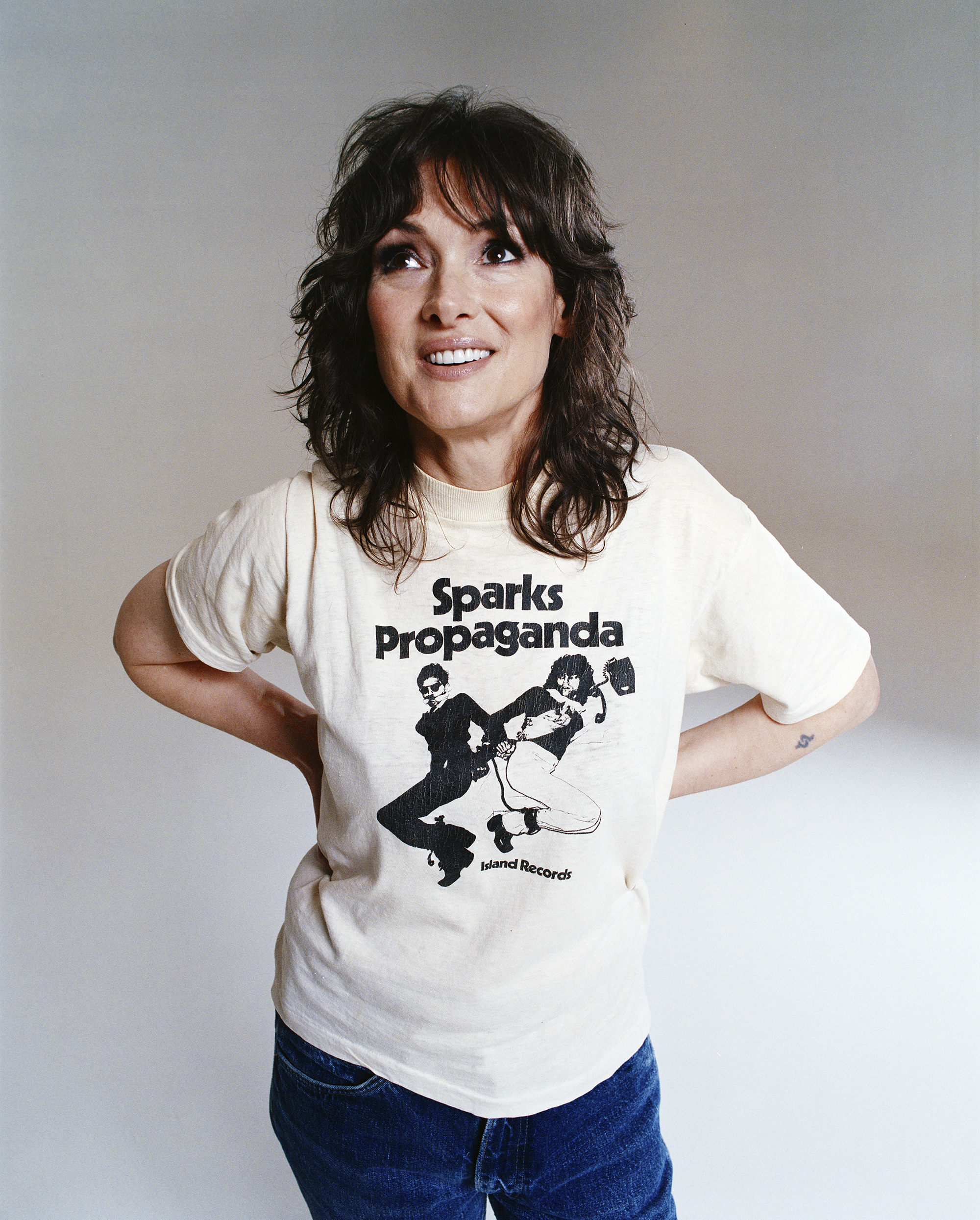
T-shirt and Jeans Winona’s Own.
RYDER: I may have told you this, but on The Crucible, the day we shot the scene where we all run into the water and he says, “You are pulling Heaven down and raising up a whore!” I was sitting next to Miller when they were setting up for the shot, and I got weirdly defensive. I was like, “Why is he calling her a whore?” And he was like, “Oh, it’s a line. It just worked.” And I was like, “Yeah, but that’s the opposite of what’s going on here.” I got into this thing with him. He wasn’t disagreeing, but he was like, “I get it. We’re not changing it.” He was also explaining to me that in that society, that’s what they would say and that’s what you would be called, even though it wasn’t your fault. It always stayed with me that Abigail got called a whore. [Laughs]
GEVINSON: Yeah.
RYDER: I feel like The Crucible is such a fascinating crucible [Laughs]. There’s so many perspectives. And obviously as a woman, I have strong feelings about what happened with those girls, but that was Salem. I was actually incredibly grateful that he reminded me that this wasn’t his opinion. This was just what happened.
GEVINSON: I think there’s been a reassessment of the Abigail-John Proctor relationship lately. On Broadway, there was the play, John Proctor is the Villain.
RYDER: And then yours was?
GEVINSON: I was in one called The Good John Proctor. There’s also one called Becky Nurse of Salem that was also within the last five years, produced in New York.
RYDER: About Rebecca, the midwife?
GEVINSON: About a descendant of Rebecca Nurse, but it takes place in Salem now. When I was in the play, The Good John Proctor, which is the girls of Salem but they’re the ages that they were in life—so Abigail’s 11 or 12 instead of 16 or 17 or whatever—my friend Talene Monahon wrote that play. We went to Miller’s archives together, and we read notebooks where he started drafting The Crucible. One of them says on the cover, “Those familiar spirits,” and I wondered if that was supposed to be the title. And there are amazing monologues that he ultimately didn’t use, that are basically Abigail talking about slut-shaming and saying, “Oh, the wind lifts up my skirt and you all call me a whore.” I think there are still pieces of that in the play.
RYDER: Wow. The writing is literally a language of its own. I was so terrified, in a way. I heard it was going to get made, and I was at the Academy Awards for Little Women, and after the show I was at the Governor’s Ball. I had heavy makeup on and I felt a little bit Joan Collins-y. I had a martini. And I met Nick Hytner [the director of The Crucible]. Anyway, I went in later that week with no makeup and pigtails, because I thought my age might be a thing. And then I had to wait three months to know if I got the part. All I knew was that Arthur Miller and Daniel Day-Lewis had casting approval, so I was like, “Did I say anything with Daniel?” I was trying to comb through in case I pissed him off, which I hadn’t. And then with Arthur Miller, I was like, he probably went to the video store to find a movie I’m in and the only movie that was there was some shitty one. I had crafted this whole thing. I think I screamed when I found out about the part. I still consider it one of my favorite experiences. It was really hard, but in the best way. I felt every muscle in my body, every millimeter of skin. There was just so much going on with her. To me, it has so much to do with gaslighting—I know gaslighting sounds so mild compared to what was going on, but the fact that she’s being called a liar is just another level of heartbreak.
GEVINSON: I read some paper once that was all about Proctor’s denial of reality as a metaphor for denying history.
RYDER: That’s powerful.
GEVINSON: It encapsulates the puritanical nature of secrecy so well, and I feel like we’re still living in it.

T-shirt and Jeans Winona’s Own. Watch Omega. Shoes Vans.
RYDER: Totally. That’s having a resurgence, and it’s quite chilling. I was just reading something about the—what’s it called, trad?
GEVINSON: Oh yeah, trad wives.
RYDER: Yeah, I didn’t know what that meant. I thought it was some sort of new slang. I never guessed that it meant traditional. It’s so steeped in the American puritanical, that culture.
GEVINSON: I’m withholding my rant about that to ask you another question.
RYDER: Me too. [Laughs]
GEVINSON: I was thinking about Stranger Things and Beetlejuice Beetlejuice, and playing parents who go to these supernatural realms to find missing children, and the combination of a very real fear and one of the worst things that can happen to someone in these fantastical worlds. How do you wrap your mind around that, and does it change your performance?
RYDER: I had this experience when I was in my early twenties: there was a girl from the town that I grew up in. Her name was Polly Klaas and she was kidnapped. I knew her family. She was missing for two months, and very tragically, she had been killed. I was doing whatever I could to help this family, to keep it in the news. When you’re around that kind of tangible grief, it’s otherworldly. She wanted to be an actress and her favorite book was Little Women, so that was a big reason I did that movie and dedicated it to her. I was actually really freaked out with Stranger Things, because I wanted them to know how fucking serious that is, and that you can’t use disappearances as a tool to advance—it feels very personal. I also talked to Polly’s dad, and a lot of my performance in that first season was connected to him. I worked really, really hard that first season, and then the show took off in a way that I have certainly never been a part of. I remember having a moment that was really liberating and relieving, when I realized the show was no longer about me.

Coat Moncler.
GEVINSON: Right.
RYDER: There were more and more storylines and characters. When you’re trying to keep that perspective and maintain that level of intense anxiety and anger, it’s so hard to do on something that shoots like that. In the first season I had to be so emotional that I was just a wreck that whole time. And then I was watching these kids at this tender age getting enormous attention that would be overwhelming for anybody, and feeling really protective and concerned, because I went through it. But it wasn’t similar at all, because technology and social media have completely changed everything.
GEVINSON: Mm-hmm.
RYDER: This has also been my first experience with what they call fandom, which is really interesting and a little bit disorienting. That’s been quite an adjustment. To be honest, it was nice to step back. Not everyone wants to live like that. I think because technology is so encompassing and integrated into people’s lives now, everything is so dramatic. When I was doing Beetlejuice Beetlejuice, I watched some reality shows and I was floored. The Housewives, oh my gosh—the fact that they all get together at the end with the host and just go at each other!
GEVINSON: To comment on what just happened, yeah.
RYDER: Yeah! My cousins worked in early reality TV, and they’re like, “A lot of it is scripted.” I hope so, because these are adults.
GEVINSON: Or they’re master improvisers.
RYDER: Right? But I do find it interesting that people are made to feel like they have to participate in that to be relevant. Look, I worry, just like anyone else, about continuing to work. I heard my whole life that women stop working once you become the mom. I remember running into some of my favorite actresses when they were in their forties who were like, “Yeah, it’s pretty bleak. I’ve been offered a witch role,” before witches were cool. But I’ve been hearing that my whole life, so it’s just baked into us. When I do the interviews, I know that it’s meant in a kind way about the movies I’ve been in, but sometimes it can come out as, “What is it like to be so old?” And it’s going to hurt, unless you just embrace it. I did always gravitate to—I was hanging out with Jason Robards when I was 15.
GEVINSON: [Laughs]
RYDER: I remember when everyone was like, “You have to get social media to work,” and those same people are like, “I’m so glad you don’t have it now.”
GEVINSON: Right. Also, culture is so much more atomized than it was even 10 years ago. It’s so much harder to get a handle on even what anyone is quote-unquote supposed to be doing to maintain an acting career. I take it as permission to just like what I like and try to make what I want to make. But it’s very hard to distill.
RYDER: That word “distill” is so appropriate. It’s like when you shake a can and open it, you almost feel like there’s a stickiness and mess that is created every time people have—I guess it’s called a moment. And I didn’t realize a lot of these moments are crafted in these meetings, which is so wild to me.
GEVINSON: I think that’s why a lot of moments feel like they’re over when they start. There are things that inspire a long and dedicated fandom, but the internet has accelerated culture so much. I was so conscious of cultural moments and what went in and out of fashion when I was younger. When you’re that young, time is slower and every day feels like its own event. And then, as you grow up, time speeds up and it becomes more of a wash. At the same time, I went from paying a lot of attention to the fashion calendar—which has a lot of turnover—when I was publishing Rookie, that’s about your teen years, which feel really long while you’re in them, but pass quickly compared to adulthood. So I felt so much anxiety about getting too old to understand or care about the same subject matter when I was only in my early twenties. Now, because of the wash we’re talking about, I actually feel way more chill about having a different relationship to time and the pace of culture. Keeping up is so impossible that there’s no point. But I’m still laden with other people’s neuroses about time and youth and age. I’ve had interactions with people where they’re like, “In my head you’re still 12.” When I was younger that seemed like something that would one day be very painful. But actually, being an adult, I’m like, “It’s very clear that that’s someone else’s shit.”
RYDER: Right. That’s such a necessary distinction. It’s interesting hearing you talk about those years, because in a sense, Stranger Things is ’80s nostalgia. I don’t feel that way about the ’80s, and I lived it. If you look at the culture of the ’80s, what movies were doing well, it was Rambo. It wasn’t kind to people like me. I got my start as the weird girl at the end of the ’80s. It was kind of brutal. It was a lot of testosterone. It was Anita Hill. It was the decade I became very politically active—I joined Amnesty [International], Artists United Against Apartheid. I was licking envelopes.

T-shirt and Jeans Winona’s Own. Watch Omega.
GEVINSON: Right.
RYDER: There’s a saying, “You’ll always be the age of your biggest or your first thing.” That’s hard to get your head around if you are interested in growing. Getting older, there are things that obviously suck, like bone density, but there’s so much great stuff with it. Even though I do feel, with what’s happening in the world and with AI, it’s scary. I’d kind of hate to be 22 right now.
GEVINSON: One thing that is so weird about ageism is that we’ll all experience every age. I’m thinking of the ageism in the beauty industry, or culture wars and social mores shifting. Ageism is so pervasive that I can dismiss someone in my head on account of their being young or old and completely forget that I was their age or will be their age. And, that their age might not actually tell me that much about them. An example is that I really liked the singer Cameron Winter, and then I saw that he was 23 and had a mini panic attack, because I grew up being identified with my youth and absorbing so many people’s neuroses about youth. And then I was like, this is so fucking boring. It’s so boring to constantly view people through the lens of age, as though that’s very meaningful, and to be consuming art through that lens of like, “Oh, this is very impressive for his age.”
RYDER: Yeah.
GEVINSON: When I was younger, I hated when people talked about my age. I also spend so much time writing about how limited age is as a category for understanding people or experiences, because you get older and might not fully remember what it’s like to be younger, and when you’re younger, you can’t fully know what it’s like to be older, so it’s just a battle of projections and hallucinations.
RYDER: Absolutely. With Diane Keaton’s passing, The First Wives Club has been on a lot, and I love the movie, but I always thought they were around my age now. They’re 46.
GEVINSON: They’re like 10 years younger.
RYDER: I remember that movie being such a big deal because it was the first time there was a huge box office opening for three women of that age.
GEVINSON: I know. It was a different time. If you hate this question, we can skip it, because it’s a little woo-woo, but with everything we’ve discussed, how do you keep your soul intact?
RYDER: Oh my gosh, that’s such an amazing thought. When you think of your soul, you want it to be free and undefined. I’ve been described as a free spirit so many times, but you don’t think of your soul as having boundaries. Jennifer Jason Leigh once talked about how she gets vulnerable and cries for scenes—she puts her palms up. I was thinking about it, because we often do the opposite. I feel like I’m trying to protect that vulnerable place, which gets harder and harder, but it’s so important. You develop tough skin when you’re constantly hearing yourself described in different ways. I know a big term lately has been “holding space,” but I’ve been trying to maintain openness to continue being moved. And that’s one of the reasons I love you so much. I’ve always felt an openness with you, a real exchange of vulnerability and beauty.
GEVINSON: Oh my god, I’m going to cry. Well, for me too. You’ve always been so generous to me. I’m so happy I’ve known you all these years and that I got to have these experiences of you giving me books and talking about movies and doing everything that you’re saying by example.
RYDER: Well, we have to work together. That’s my big dream.
GEVINSON: Oh, please. That’s next.
RYDER: Thank you so much for doing this, I was really hoping that you could, and it means a lot to me.
GEVINSON: My pleasure. It was so fun. Different things I wanted to come back to were flying past, and I was like, we’re going to pick a few and then we’re just going to have to talk more later.
RYDER: Yes.
GEVINSON: It’s so great to see you. Let me know when you’re back.
RYDER: I will.

———
Hair: Chris McMillan using Chris McMillan Hair at Solo Artists.
Makeup: Angela Levin using Chanel Beauty at Solo Artists.
Nails: Eri Ishizu at The Wall Group.
Set Design: Robert Doran at Frank Reps.
Tailor: Irina Tshartayan.
Photography Assistant: Derek Perlman.
Fashion Assistant: Natalia Zamudio.
Set Design Assistant: Jafet Arango.
Production Director: Alexandra Weiss.
Executive Producer: Georgia Ford.
On-set Production: Cecilia Alvarez Blackwell.
Production Assistant: Alondre Peoples.
Location: Nova Studios.


